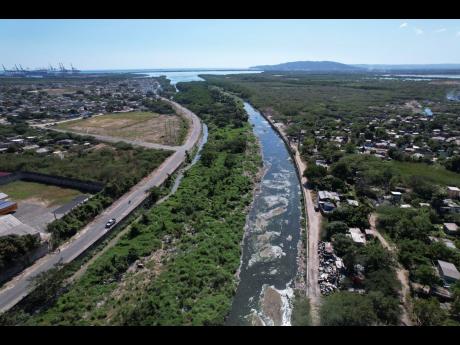Neil Richards | Sandy Gully system – a proven blessing
Apart from civil engineers who admire the construction style and functionality of the paved gullies of Kingston and St Andrew, the average citizen seems to barely tolerate their existence — judging by how the ‘gullies’ are so frequently treated with disdain.
It was about 70 years ago that a pre-Independence government of Jamaica initiated the Sandy Gully Scheme, which resulted in the construction of properly designed drains to control flooding of the city during and following torrential rainfall. A mighty job was done in that regard, and the extensive network of paved drains has given intensive service since their completion.
There is no glamour to the stark, naked drains when compared to the green-clad semi-circle of St Andrew hills that pour water into them or the ever-changing sky colour worn by the magnificent Kingston Harbour that receives that water, but the down-to-earth drains do have great civic and life-saving worth and should be a flagship of the municipality.
It is about time that the bulk of the blame for the ‘sorry state’ of many of the drains be lifted from the shoulders of central government and local government and placed on those of the uncaring and unmindful citizens who ‘dutty up Jamaica’.
CREATE HAVOC
The Liguanea Plain, on which Kingston now sprawls, is a mainly two-way tilted surface, readymade for stormwater to create havoc when there’s torrential rainfall. There is a distinct downslope from Constant Spring, which continues almost non-stop to Kingston Harbour, and there is also a slope from the Hope River and Papine westwards, all the way to the low-lying, swamp-prone south-western sections of the city.
The rapid northern expansion of the city of Kingston in recent decades has caused the flow of storm water into the Sandy Gully system to be more complex and often uncontrolled, leading to dire consequences.
Such was the devastation caused by Hurricane Charlie in 1951 that members of the House of Representatives unanimously agreed to expedite implementation of stormwater-control measures recommended by engineers.
To accomplish that objective, the former and famous Public Works Department (the precursor to the current National Works Agency) was assigned responsibility as construction manager of the Sandy Gully Scheme. The completed project was, and is still, regarded as a successful major engineering achievement.
Several major and minor channels were built during the late 1950s and early 1960s, using easily available limestone rock and cement from the Caribbean Cement Company, which began operations in 1952.
ENHANCE SYSTEM
The following measures should be considered for inclusion in actions to enhance the Sandy Gully System:
1. Continue the installation of garbage traps in the manner already implemented where seven of the gullies terminate in the sea.
2. Reinforce the campaign to ‘Nuh Dutty Up Jamaica’ with measures that will impact owners of properties adjacent to the gullies so that they would more likely refrain from dumping garbage, household appliances, vegetation, and sewage in the drains.
3. Appoint ‘gully wardens’ to monitor and report on the physical condition of the drains, the excess vegetation in and at the walls, and the practices that contribute to their misuse. Institute penalties for persons who dump debris into the drains.
4. Maintain access reservation along ‘gully banks’ and disallow the constructing of buildings adjacent to the ‘gullies’ to enable gully maintenance, the passage of utilities, and access by law-enforcement personnel.
5. Reconstruct the damaged sections of the drains to forestall further damage to the walls and bases.
Fundamental actions necessary to enhance the paved drains of Kingston and St Andrew have much to do with the exercise of responsible citizenship.
Neil Richards is an architect and town planner. Send feedback to columns@gleanerjm.com.


